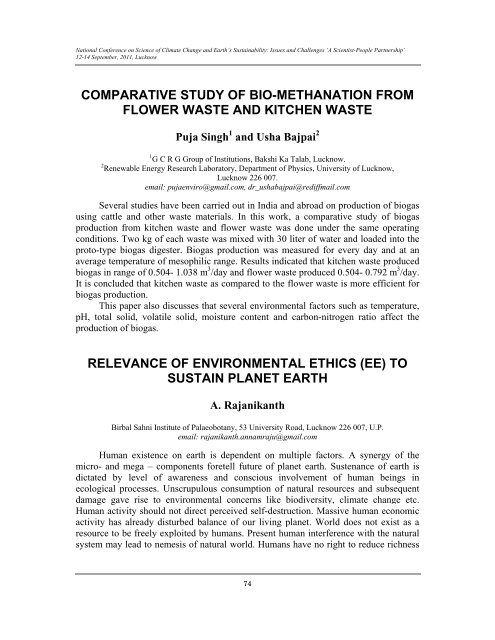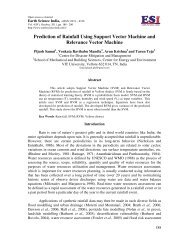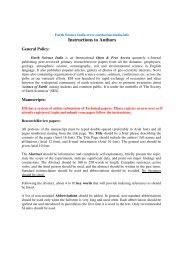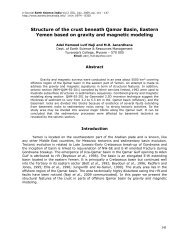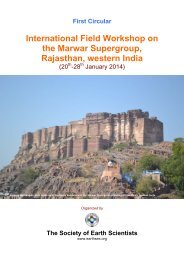12-14 September, 2011, Lucknow - Earth Science India
12-14 September, 2011, Lucknow - Earth Science India
12-14 September, 2011, Lucknow - Earth Science India
You also want an ePaper? Increase the reach of your titles
YUMPU automatically turns print PDFs into web optimized ePapers that Google loves.
National Conference on <strong>Science</strong> of Climate Change and <strong>Earth</strong>’s Sustainability: Issues and Challenges ‘A Scientist-People Partnership’<br />
<strong>12</strong>-<strong>14</strong> <strong>September</strong>, <strong>2011</strong>, <strong>Lucknow</strong><br />
COMPARATIVE STUDY OF BIO-METHANATION FROM<br />
FLOWER WASTE AND KITCHEN WASTE<br />
Puja Singh 1 and Usha Bajpai 2<br />
1 G C R G Group of Institutions, Bakshi Ka Talab, <strong>Lucknow</strong>.<br />
2 Renewable Energy Research Laboratory, Department of Physics, University of <strong>Lucknow</strong>,<br />
<strong>Lucknow</strong> 226 007.<br />
email: pujaenviro@gmail.com, dr_ushabajpai@rediffmail.com<br />
Several studies have been carried out in <strong>India</strong> and abroad on production of biogas<br />
using cattle and other waste materials. In this work, a comparative study of biogas<br />
production from kitchen waste and flower waste was done under the same operating<br />
conditions. Two kg of each waste was mixed with 30 liter of water and loaded into the<br />
proto-type biogas digester. Biogas production was measured for every day and at an<br />
average temperature of mesophilic range. Results indicated that kitchen waste produced<br />
biogas in range of 0.504- 1.038 m 3 /day and flower waste produced 0.504- 0.792 m 3 /day.<br />
It is concluded that kitchen waste as compared to the flower waste is more efficient for<br />
biogas production.<br />
This paper also discusses that several environmental factors such as temperature,<br />
pH, total solid, volatile solid, moisture content and carbon-nitrogen ratio affect the<br />
production of biogas.<br />
RELEVANCE OF ENVIRONMENTAL ETHICS (EE) TO<br />
SUSTAIN PLANET EARTH<br />
A. Rajanikanth<br />
Birbal Sahni Institute of Palaeobotany, 53 University Road, <strong>Lucknow</strong> 226 007, U.P.<br />
email: rajanikanth.annamraju@gmail.com<br />
Human existence on earth is dependent on multiple factors. A synergy of the<br />
micro- and mega – components foretell future of planet earth. Sustenance of earth is<br />
dictated by level of awareness and conscious involvement of human beings in<br />
ecological processes. Unscrupulous consumption of natural resources and subsequent<br />
damage gave rise to environmental concerns like biodiversity, climate change etc.<br />
Human activity should not direct perceived self-destruction. Massive human economic<br />
activity has already disturbed balance of our living planet. World does not exist as a<br />
resource to be freely exploited by humans. Present human interference with the natural<br />
system may lead to nemesis of natural world. Humans have no right to reduce richness<br />
74


